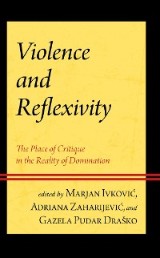Details

Violence and Reflexivity
The Place of Critique in the Reality of Domination|
44,99 € |
|
| Verlag: | Lexington Books |
| Format: | |
| Veröffentl.: | 23.05.2022 |
| ISBN/EAN: | 9781666910193 |
| Sprache: | englisch |
| Anzahl Seiten: | 200 |
DRM-geschütztes eBook, Sie benötigen z.B. Adobe Digital Editions und eine Adobe ID zum Lesen.
Beschreibungen
<p><span>Addressing the relationship among social critique, violence, and domination, </span><span>Violence and Reflexivity: The Place of Critique in the Reality of Domination</span><span> examines a critique of violent and unjust social arrangements that transcends the Enlightenment/postmodern opposition. This critique surpasses the “reflexive violence” of classical enlightenment universalism without committing the “violence of reflexivity” by negating any possibility of collective radical social engagement. The unifying thread of the collection, edited by </span><span>Marjan Ivković, Adriana Zaharijević</span><span>,</span><span> and Gazela Pudar-Draško, is a sensitivity to the field of tension created by these extremes, especially for the issue of how to articulate a non-violent critique that is nevertheless “militant,” in the sense that it creates a rupture in an institutionalized order of violence. In Part One, the contributors examine the theoretical resources that help us move beyond the reflexive violence of the classical Enlightenment social critique in our quest for justice and non-domination. Part Two brings together nuanced attempts to reconsider the dominant modern understandings of violence, subjectivity, and society without succumbing to the violence of reflexivity that characterizes radically anti-Enlightenment standpoints.</span></p>
<p></p>
<p></p>
<p><span>This book presents a multi-faceted reconsideration of dominant approaches to violence and social critique. Its unifying thread is a dedication to overcoming violence and domination on a scale larger than individual micro-resistances, even as many contributors reject programmatic thought and “self-possessed” political action.</span></p>
<p></p>
<p></p>
<p><span>Acknowledgments</span></p>
<p><span>Introduction </span></p>
<p><span>Marjan Ivković, Adriana Zaharijević and Gazela Pudar-Draško</span><span> </span></p>
<p></p>
<p><span>Part One: Reflexive Violence: Critique, Negativity, and Contingency</span></p>
<p><span>Chapter One: Violence of the Concept in Hegel </span></p>
<p><span>Zdravko Kobe </span></p>
<p><span>Chapter Two: Subjectivity and Violence: A Hegelian Perspective </span></p>
<p><span>Luca Illetterati</span></p>
<p><span>Chapter Three: Against Autonomy: Freedom as Heteronomy without Servitude </span></p>
<p><span>Vladimir Safatle</span></p>
<p><span>Chapter Four: The Ethics and </span><span>Politics</span><span> of Nonviolence </span></p>
<p><span>Judith Butler</span></p>
<p></p>
<p><span>Part Two: Violence of Reflexivity: Practicing Critique Today</span></p>
<p><span>Chapter Five: Violence of Critique </span></p>
<p><span>Predrag Krsti</span><span>ć</span></p>
<p><span>Chapter Six: Critique as a Microphysics of Freedom: A Disposition beyond the Dispositive</span></p>
<p><span>Gaetano Chiurazzi</span></p>
<p><span>Chapter Seven: </span><span>Violence and the Apocalypse: Beyond the Hobbesian Vision </span></p>
<p><span>Siniša Malešević</span></p>
<p><span>Chapter Eight: The Police: Instituting Violence</span></p>
<p><span>Petar Bojani</span><span>ć and Gazela Pudar-Draško</span></p>
<p><span>Chapter Nine: Emancipation of Women vs. Misogyny</span></p>
<p><span>Sanja Bojanić</span></p>
<p><span>Index</span></p>
<p><span>About the Contributors</span></p>
<p></p>
<p><span>Introduction </span></p>
<p><span>Marjan Ivković, Adriana Zaharijević and Gazela Pudar-Draško</span><span> </span></p>
<p></p>
<p><span>Part One: Reflexive Violence: Critique, Negativity, and Contingency</span></p>
<p><span>Chapter One: Violence of the Concept in Hegel </span></p>
<p><span>Zdravko Kobe </span></p>
<p><span>Chapter Two: Subjectivity and Violence: A Hegelian Perspective </span></p>
<p><span>Luca Illetterati</span></p>
<p><span>Chapter Three: Against Autonomy: Freedom as Heteronomy without Servitude </span></p>
<p><span>Vladimir Safatle</span></p>
<p><span>Chapter Four: The Ethics and </span><span>Politics</span><span> of Nonviolence </span></p>
<p><span>Judith Butler</span></p>
<p></p>
<p><span>Part Two: Violence of Reflexivity: Practicing Critique Today</span></p>
<p><span>Chapter Five: Violence of Critique </span></p>
<p><span>Predrag Krsti</span><span>ć</span></p>
<p><span>Chapter Six: Critique as a Microphysics of Freedom: A Disposition beyond the Dispositive</span></p>
<p><span>Gaetano Chiurazzi</span></p>
<p><span>Chapter Seven: </span><span>Violence and the Apocalypse: Beyond the Hobbesian Vision </span></p>
<p><span>Siniša Malešević</span></p>
<p><span>Chapter Eight: The Police: Instituting Violence</span></p>
<p><span>Petar Bojani</span><span>ć and Gazela Pudar-Draško</span></p>
<p><span>Chapter Nine: Emancipation of Women vs. Misogyny</span></p>
<p><span>Sanja Bojanić</span></p>
<p><span>Index</span></p>
<p><span>About the Contributors</span></p>
<p></p>
<p><span>Marjan </span><span>Ivković</span><span> is senior research</span><span>er at the Institute for Philosophy and Social Theory at the University of Belgrade. </span></p>
<p></p>
<p><span>Adriana Zaharijević</span><span> is senior research fellow at the Institute for Philosophy and Social Theory at the University of Belgrade. </span></p>
<p></p>
<p><span>Gazela Pudar Draško</span><span> is researcher at the Institute for Philosophy and Social Theory at the University of Belgrade and Director of the Institute. </span></p>
<p></p>
<p><span>Adriana Zaharijević</span><span> is senior research fellow at the Institute for Philosophy and Social Theory at the University of Belgrade. </span></p>
<p></p>
<p><span>Gazela Pudar Draško</span><span> is researcher at the Institute for Philosophy and Social Theory at the University of Belgrade and Director of the Institute. </span></p>
Diese Produkte könnten Sie auch interessieren:

Die ethische Vertretbarkeit von Sterbehilfe. Eine Diskussion zwischen Utilitarismus und Deontologie

von: Till Kallenborn

15,99 €
















